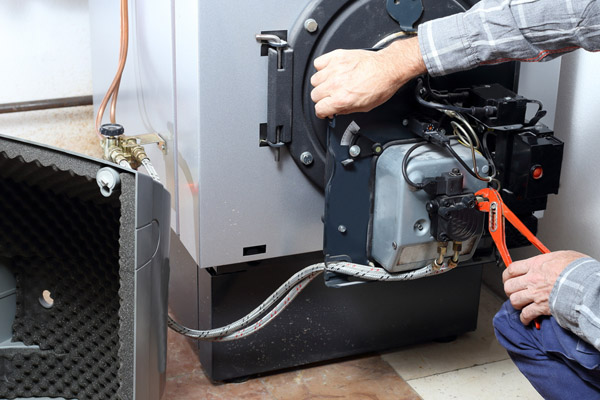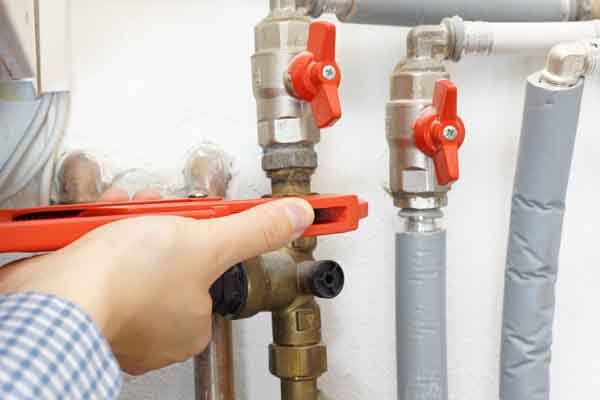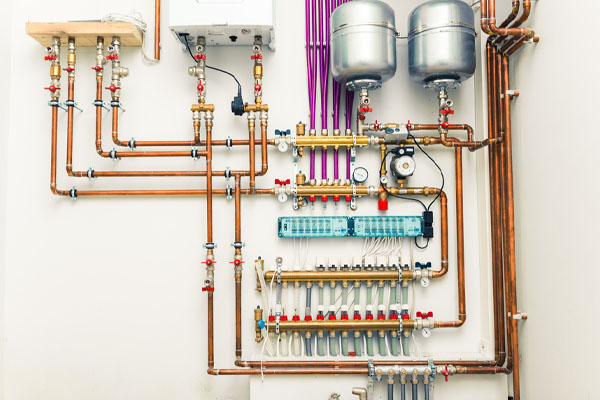At the core of an efficient home heating system lies a robust boiler, essential for ensuring warmth and comfort in the chillier months. However, an issue that often unsettles this balance is the occurrence of boiler leaks. These leaks, while impacting the overall efficiency, also raise questions about safety and upkeep. In the ensuing conversation, this article will explore the multiple reasons behind water leaking from boiler. We’ll offer clarity on this topic and guide you through the essential measures to tackle and avert water leakage from boilers.
5 Reasons Your Boiler Is Leaking

1. Issues with Boiler Pressure Valve
The pressure relief valve is a crucial safety feature in boilers, releasing excess pressure to prevent dangerous over-pressurization. It activates to expel water or steam if the boiler’s internal pressure exceeds safe limits, maintaining balanced and secure pressure levels.
Leakage in the pressure relief valve often indicates problems like excessive pressure buildup, commonly caused by a malfunctioning expansion tank. This leads to increased system pressure, activating the valve. Other causes can include sediment build-up, valve wear and tear, or improper installation.
Ignoring issues with the pressure relief valve can lead to serious consequences, such as unexpected hot pressure or steam discharges, damaging property and posing scalding risks, or even causing boiler eruptions. Regular inspections, maintenance, and prompt responses to valve issues are essential for boiler safety and efficiency.
2. Degradation or Impairment of Boiler Pipes
Pipes are essential in distributing water and steam in heating systems, acting as conduits from the boiler to radiators or heaters.
Pipe degradation can occur due to aging, water quality, and chemical interactions within the system. Constant high temperature and pressure exposure can cause rust or scale formation, while mineral-rich or acidic water can speed up corrosion. Chemical reactions between water additives and pipe materials also contribute to faster degradation.
Corroded pipes increase the risk of leaks in the boiler system, leading to water loss and reduced efficiency. This corrosion weakens pipe structure, heightening the risk of failure and causing water damage to surrounding areas and property. Additionally, corrosion lining inside pipes can restrict water or steam flow, affecting heat distribution.
3. Compromised Boiler Seals and Gaskets

Seals and gaskets are key to the boiler system’s integrity, creating watertight and airtight connections to keep water and steam within specific areas.
Their degradation is usually due to regular wear, high temperatures, and chemical or mineral interactions in the water. These factors can result in:
- Progressive degradation
- Reduced pliability
- Becoming prone to brittleness
- Increased vulnerability to malfunctions
- Overall wear and decline
- Accumulation of mineral or chemical deposits
- Hastened wear, culminating in potential failure
Leaking seals and gaskets negatively impact the boiler’s function and efficiency, causing water or steam to stray from their paths. This leads to lower water levels and system pressure, forcing the boiler to work harder to maintain temperature and pressure, increasing energy use and reducing efficiency. Additionally, these leaks can allow airborne contaminants to enter, further diminishing the system’s effectiveness.
4. Problems with Boiler Expansion Tanks
The expansion tank plays a key role in regulating pressure variations in the boiler system. Its primary function is to adjust to water’s inherent expansion and contraction as it undergoes heating and cooling throughout the system’s operation. However, if the tank becomes saturated with water due to a compromised bladder or diaphragm, faces challenges with air pressure from malfunctioning air valves, or lacks proper maintenance, it can instigate many complications. A waterlogged tank can cause:
- Elevated pressure levels
- Water leakages
Improper air pressure configurations can result in insufficient pressure alleviation throughout the heating cycle. Such irregularities can introduce safety hazards and adversely impact the boiler’s comprehensive functionality and its ability to operate energy-efficiently.
5. Degradation of Boiler Heat Exchanger

The heat exchanger plays a crucial role, channeling heat from the combustion chamber to the water, which is then disseminated across the heating system. Factors like water quality and mineral accumulation can lead to this component’s corrosion. Once the heat exchanger succumbs to corrosion, there’s a heightened risk of water leaks or even the emission of carbon monoxide and other dangerous gases into the system. These complications hamper the boiler’s operational efficiency and present serious health and safety risks.
Indicators of a Boiler Leak
Homeowners should be alert to potential signs indicating a boiler leak. Typical signs to look out for are:
- Water puddles or droplets around the boiler area
- Watermarks or changes in color on walls or ceilings close to the boiler
- A discernible drop in system pressure
- Addressing these signs without delay is imperative to thwart escalating harm to the boiler and its vicinity. Neglecting a boiler leak can result in:
- Widespread damage
- Diminished performance
- Potential safety risks
- Proliferation of mold
- Electrical complications
If homeowners detect or even suspect a boiler leak, they should act swiftly, such as contacting a skilled technician to evaluate and rectify the problem.
Boiler Care & Upkeep
Steps to Prevent Boiler Leaks
- Arrange for expert boiler inspections on an annual basis.
- Oversee and ensure appropriate water chemistry, incorporating additives when necessary.
- Promptly identify and mend any corroded or impaired pipes.
- Confirm the pressure relief valve operates as intended.
- In colder regions, insulate the pipes and the boiler to avert complications arising from freezing.
- Periodically review seals, gaskets, and expansion tanks for indications of deterioration or harm.
The Value of Professional Boiler Inspections and Maintenance

- Trained technicians have the expertise to spot potential issues before they escalate into leaks.
- Professionals can fine-tune and cleanse the boiler, ensuring peak efficiency.
- An expert’s evaluation ensures safety and adherence to prevailing standards and regulations.
Measures Homeowners Should Implement for Optimal Boiler Functionality and Leak Prevention
- Regularly check the boiler’s pressure and temperature.
- Stay alert for atypical sounds or unfamiliar smells.
- Respond swiftly to any signs of malfunction by reaching out to an HVAC specialist.
- Adhere to the manufacturer’s instructions concerning maintenance, usage, and safety protocols.
- Ensure the space around the boiler remains neat and has proper ventilation.
- Contemplate entering into a preventive maintenance agreement with a reputable service provider.
DIY vs. Expert Boiler Fixes
While the DIY approach might appeal to some homeowners for boiler leak repairs, it’s imperative to consider the advantages of hiring professional HVAC technicians. Undertaking DIY fixes carries inherent dangers, from limited know-how, and potential safety threats to the danger of escalating the existing problem. On the other hand, certified technicians have vast experience, specialized instruments, and a deep understanding of safety standards. Their skill set guarantees precise repairs and adherence to all necessary regulations. Regarding boiler leak solutions, leaning on professional services is undeniably the most secure and efficient route.
In Summary
Various issues, including pressure valve malfunctions, pipe corrosion, damaged seals and gaskets, expansion tank problems, and heat exchanger degradation, can cause boiler leaks. Early detection and prompt repair are crucial to prevent further damage and safety risks. Hiring experienced professionals for boiler repair and maintenance is advisable, as they have the expertise and tools to effectively fix these issues, ensuring your boiler’s optimal performance and safety. Timely action is essential for maintaining home warmth and comfort.
Tevis Energy’s sister company, Modern Comfort, performs HVAC installations, replacements, tune-ups, and more. Our technicians can provide you with expert HVAC services to ensure that your system provides you with the comfort and efficiency you deserve. Call now to schedule an appointment.
Call Tevis Energy For All Your HVAC Requirements

For high-quality heating and cooling services in central Maryland and southern Pennsylvania, call Tevis Energy. Our team of highly skilled and professionally certified technicians specializes in excellent HVAC replacements, installations, repairs, tune-ups, and more. Count on all our knowledgeable and experienced techs to service your HVAC system correctly.
Our company offers highly competitive heating and cooling service costs. Our maintenance services can assist in improving indoor air quality, comfort, and energy efficiency in your home while reducing your heating and cooling bills. We can help you find the best solutions within your budget if you need an HVAC repair or replacement system. All our work is backed by a guarantee to ensure your satisfaction. Give Tevis Energy a call to schedule a service appointment. We offer free, in-home estimates. Call now!
You can click here to contact us now or call us at (410) 876-6800 to find out more! Click the link to view our service area.
Related Articles:
